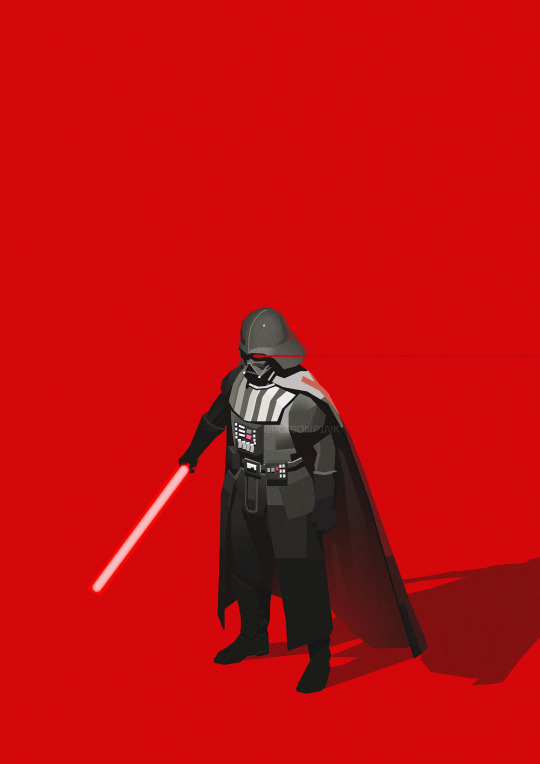Text
anakin is so interesting to me bc he is both the hero in denial to whom the oracle delivers the tragic prophecy AND the oracle himself who knows whats coming but is disbelieved and so spirals into a lonely madness
8 notes
·
View notes
Text







If you were the shepherd and I was the lamb, and long was the journey and dark was the land, who would be following? Who would be free? And who would believe that the shepherd was me? (x)
for @padmestrilogy - thank you for writing and sharing your beautiful padmé analysis <3
66 notes
·
View notes
Text
i think one of the reasons i dont vibe with a lot of modern "romantic" writing is that there's a notable lack of sweetness or tenderness written between the characters. the most popular tropes for intimacy negotiation between characters in modern romantic novels seem to be based around overcoming their own disdain, distrust, or resentment of the other character. an increasingly lazy, kneejerk "i hate how much i want them" approach to romantic and physical intimacy. true love requires doubt, they tell us. our desires can only be trusted when we douse them in cold hard rationality. no i'm not trying to come for the enemies rivals irritating workplace acquaintances to lovers trope that's so popular (although i'm also deeply bored by that). rather, i think it demonstrates a general jadedness in a genre that's otherwise supposed to be about "wish fulfillment HEA" yet struggles to conceive characters for whom tenderness and all-consuming desire is not a weakness. the irrationality that love can instill in a person is held at arm's length, a toxic impulse that must be adjusted in order to present a "healthy relationship." the overly-emotional lover has been relegated to "dark romance," or their behaviors channeled into specific genre-approved tropes which fit neatly into hetero-dominant relationship expectations. so much of it ends up reading pathos-less to me. in the hands of a talented writer, unhinged tenderness is the most excruciating possible thing to read. we used to have that, you know. we used to be a society.
96 notes
·
View notes
Photo
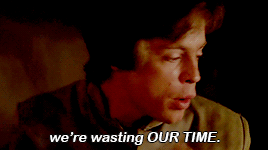
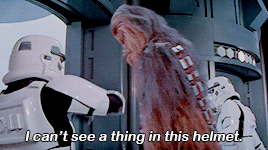
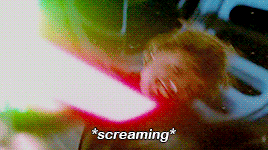
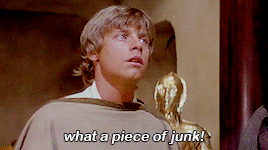
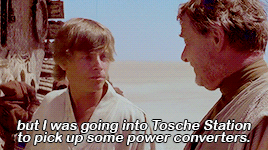
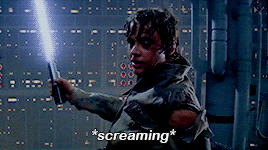
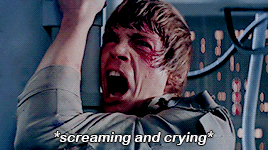
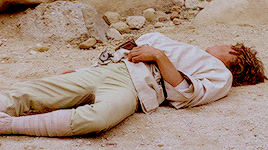
“I’m Luke Skywalker. I’m here to rescue you!”
7K notes
·
View notes
Note
favorite canonical padmé moment?
first of all thank you so much for the question!!!
This was harder to answer than I previously thought but after some consideration I volunteer this scene from rots.

this scene is important to me because unlike other movies Padmé’s eyes were wide open about palpatine and the senate this time even though anakin is still pretty much her blind spot.
this also explains why she said fuck all of that and focused on bringing anakin back to earth in mustafar because she knew system had to go, obviously she would’ve preferred it happened in different circumstances but she pretty much could’ve let that go if anakin listened to her.
it shows her morally gray side I think it is really interesting and makes her much more compelling as a character.
4 notes
·
View notes
Text
thinking about anakin's line we don't have to run away anymore as a motivation for anakin's actions. yes, he was mostly focused on "saving" padme from death, but there's less discussion of what he envisioned for their lives together after. rule the galaxy together, sure, but i think we don't have to run away anymore is a deeper and more tragic cut.
there's little exploration in ROTS of how anakin conceptualized their lives post-baby, mostly that he was avoiding confronting the issue. we know padme wanted to run away by the end, but anakin would understandably have found this an impossible prospect. he's the chosen one, maybe the most important jedi to ever live, he's functioned since childhood as a political tool, this isn't just his duty but his destiny. palpatine offers anakin a possibility for saving padme's life, yes, but through suggestion, also offers anakin the only attainable possibility for remaining both the chosen one and padme's husband. the father to her child.
i spend a lot of time thinking about how anakin was never allowed to use his love for his family to empower himself and his contributions to the galaxy (until ROTJ obv). its not just anakin's romantic love that palpatine weaponizes but his familial love. the promise of it. i think this is also why i find effective thematic continuity between the prequel trilogy and andor, as andor deals with many of the same questions. do you fight for the benefit of your family? or must you relinquish your family for the good of the fight?
what might that choice do to a person?
#anakin skywalker#anidala#anakin x padme#sw prequels#leaving this in the tags but this also ties into my vader disability/ableism reading#disallowing disabled people from having or rearing children is a primary pillar of ableist societies#OBVIOUSLY i realize this is not how the family ban functions from the perspective of the jedi in-universe lol dont @ me#i just mean thematically it can be read as relevant to the experience of systemic ableism#my analysis
27 notes
·
View notes
Text
not - big thief
209 notes
·
View notes
Text
reading the aotc novelization is sooooo funny cause tell me why in the meadow scene when Padmé thinks that Anakin got hurt by the shaak she literally refers to that as "her whole world crashing down"
Like ma'am,you've just re-met this guy two days ago...

27 notes
·
View notes
Text
vader and disability: a complex narrative
there’s lots of writing about disabled vader which you should go read if you're going to listen to anything i'm saying about it, because i am canonically just some guy and opinions vary, as they should. every vader disability analysis i’ve read rightfully establishes the problematic aspects of disability representation in the star wars canon, most notably the use of disfigurement, amputation, and medical tech as signifiers for vader's evil, particularly in the OT, as well as in the climax of ROTS. this is obviously an essential critique: disability as a shorthand for evil is a deeply harmful trope dating back...well, about as far back as people have hated disabled people. so....a while.
however, the discourse i’ve read struggles to go much deeper than 'disabled villain bad.' this feels like a missed opportunity, given that vader is not a one-dimensional villain or a simple boogie man but a complex character with six full-length films centered on his development and arc. we can acknowledge the harmful implications of this trope and also ask: is there more to unpack here? given that darth vader is one of the most iconic characters in movie history, and he's also disabled, is it not worth our time?
like a lot of star wars discourse, vader disability discourse tends to reject the ways in which lucas complicated his own narrative in the prequel trilogy. anakin's evil is more often framed as internally motivated and absolute: he turns evil, then he turns disabled to reflect this internal state, upholding the harmful trope. anakin's experience of medicalization and pathologization from TPM onwards are left out of the analysis. his in-universe experience of disability and ableism is flattened. lucas' own stated intention of illustrating anakin's victimhood is denied.
this is one of the central schisms at the heart of star wars discourse: whether to accept or reject anakin's victimhood. i would argue that this is inherently bound up in his status as a disabled character. disabled victims, especially imperfect disabled victims, are almost never represented in this way: as the central pillars of their own stories and collaborators in their own end.
so yes, ultimately both the depiction of vader, of anakin, and the popular response to his characterization are products of an ableist society. that ouroboros is undeniable. however, in our ableist society, disabled characters (and people) are more than anything treated as disposable, adjacent, unnecessary. in this sense, anakin breaks the mold and is punished for it, both within his own story and by those who consume it. he cannot be both a victim and a perpetrator, a disabled hero and a disabled villain, because people struggle to extend that much range of humanity to disabled people. it must be a mess up. the writing got it wrong. is this really george lucas' failure to represent disability in the appropriate way? or is this just who we are? what we expect to see?
as i mentioned above, vader disability discourse also tends to flatten anakin's experience of disability. there's an assumption that anakin doesn't really experience any in-universe impacts of his disabilities, that they exist only as a visual signifier to us, the audience, of his internal evil. but reading anakin as disabled in-universe only strengthens his arcs in both his trilogies. why should i, a disabled viewer, reject that reading? why should we assume the galaxy far far away is not subject to the social model of disability too?
the social model of disability argues that disability isn't a fixed or objective state, but rather a circumstance which arises due to social barriers and attitudes. this runs counter to the medical model of disability, which holds disability as an individual biological problem that can either be cured or not. obviously, many disabled people live with incurable medical diagnoses -- the social model of disability doesn't deny that. rather, it argues that greater harm is caused by the social and structural response to disabling diagnoses than by the diagnoses themselves.
if the viewer rejects the idea that anakin experiences negative impacts from his disabilities, they may also reject the idea that there was any structural failure on the part of the jedi, or any active manipulation on the part of palpatine. the fact that disabled children are often failed, neglected, or actively abused, and that this treatment may exacerbate the harm these same children later cause to themselves, their relationships, and their communities, well.....it's not really something people enjoy talking about. the harm that anakin causes from his own choices does not negate a disability reading, just as a disability reading doesn’t negate the harm he causes. disabled people can and do cause harm. disabled people can be both complicit in destructive systems as well as victimized by them. by reducing anakin’s disabilities to a simple visual shorthand for evil and denying the ways they impact him in-universe, viewers can uphold a simplistic reading of the saga in which good and evil are organic absolutes, uncomplicated by systemic and social failures. not only does this ignore the more interesting elements of lucas’ storytelling choices, it misses the opportunity for reclamation and deeper analyses of complex disability narratives.
as a rebuttal, i would argue that anakin's disabilities create experiences of medicalization, pathologization, objectification, and dehumanization for the entirety of his arc.
anakin's first experience with the jedi is one of medicalization. as a plot device, the midi-chlorians are hated by many, but they tie explicitly into this medicalization reading. anakin's blood is drawn and analyzed by qui gon. he is brought in to a panel of experts who test him and analyze the results. he's simultaneously told that his readings are off the charts and that he can't be helped, he can't be trained. he can't be fixed.
anakin's subsequent "acceptance" into the jedi temple is tinged by constant pathologization. it doesn't really matter how viewers diagnose anakin, wherever on the spectrum of mental/emotional/cognitive/developmental disability, many readings may work. what's clear is that anakin's emotional experience is viewed as abnormal by the people around him. anakin can't control his emotional reactions to the degree the jedi expect and require, and this earns him distrust and active disdain. basic human needs like validation, affection, and respect are denied to him, with this neglect sometimes framed as a direct response to his unwanted compulsive emotional behaviors. in truth, anakin doesn't need a diagnosis from our world; he is experiencing the disabling stigma of such a diagnosis, in his world, either way.
as his arc progresses, vaderkin's life is increasingly informed by physical disability. he becomes a burn victim and a quadruple amputee. while it's not really explicit in the movies, supplemental materials suggest that vader's use of cyborg limbs and breathing equipment make others in the imperial bureaucracy relate to him as less-than-human. he's seen as more object than person, half-man, half-machine. again, it's hard to separate creator ableism out from the in-universe ableism we may be searching for. do vader's prosthetics make him inhuman because lucas holds them as such? or is the objectification and loss of agency vader experiences through his physical disability part of his victimhood? has this framing shifted throughout the history of canon?
in his final form, vader is heavily disabled, dependent on medical technology to stay alive. the sound of his mechanized breathing is one of the most recognizable elements of his character. i would never criticize someone for taking issue with the stigmatizing aspects of this depiction, the problems inherent in equating medical tech use with a lack of humanity. but we can also interpret this through the lens of in-universe ableism. vader's suit was never designed to be an actual adaptive accommodation. instead, it's a form of control and torture which he didn’t explicitly choose for himself. in this sense, anakin is again a victim of medicalization, a curative model of disability which seeks to return the disabled person to a useful participant in the system, or else discard them.
and although anakin removes his mask at the end of his life, none of the choices that allow for his redemption are negated by his disabilities. it is that same disabled man in the suit who throws down palpatine, not a physically "restored" version of his "better" self. again, vader breaks the mold of the disabled villain trope, his complex personhood ultimately upheld in spite of the systemic violence he has experienced and perpetuated.
so yes, in spite of the ableism which has shaped anakin's story, both within and without of his own universe....in the end, i find anakin's disabled humanity at the center of it all. <3
#prev tags no exactlyyyyyyyy#the 'anakin needs a therapist' approach to his 'issues' is like......well sure! wouldn't hurt!#but the point im trying to make here is more that ableist societies punish and dehumanize people for needing any help at all#and that causes complex generational harm#and whether its fully acknowledged by all the source materials or not#the gffa is definitely an ableist society
38 notes
·
View notes
Text

he's such a mood
1 note
·
View note
Text
i’m like if an angel fell from heaven and got insanely fucked up from the impact
13K notes
·
View notes
Video
this is a real deleted scene from revenge of the sith
251K notes
·
View notes



